Items
Search full-text
“Commonwealth Disability Strategy launched in December 1994”
-
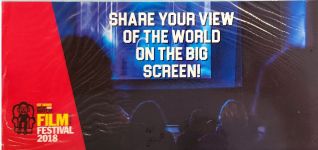 "Tutti Arts - Sit Down Shut Up & Watch - Promotional Card 2018" Tutti Arts - 'Sit Down Shut Up & Watch 2018 Promotional Card - reads, in part “Share your view of the world on the big screen … / … Sit Down Shut Up and Watch is Australia's Premier learning disability led film festival celebrating films and new media made by people with a learning disability.”
"Tutti Arts - Sit Down Shut Up & Watch - Promotional Card 2018" Tutti Arts - 'Sit Down Shut Up & Watch 2018 Promotional Card - reads, in part “Share your view of the world on the big screen … / … Sit Down Shut Up and Watch is Australia's Premier learning disability led film festival celebrating films and new media made by people with a learning disability.” -
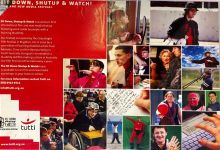 "Tutti Arts - Sit Down Shut Up & Watch - Promotional Flyer 2022" Tutti Arts - 'Sit Down Shut Up & Watch 2022 Promotional Flyer - reads, in part “Sit Down, Shutup & Watch is Australia’s first international film and new media festival featuring work made by people with a learning disability.”
"Tutti Arts - Sit Down Shut Up & Watch - Promotional Flyer 2022" Tutti Arts - 'Sit Down Shut Up & Watch 2022 Promotional Flyer - reads, in part “Sit Down, Shutup & Watch is Australia’s first international film and new media festival featuring work made by people with a learning disability.” -
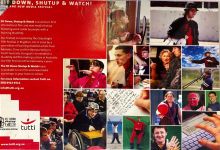 "Tutti Arts - Sit Down Shut Up & Watch - Promotional Flyer 2018" Tutti Arts - 'Sit Down Shut Up & Watch 2018 Promotional Flyer - reads, in part “Sit Down Shutup and Watch Australia's premier learning disability led film festival 19-20 October 2018 Angaston, Barossa Valley Two days of short films, talks, workshops and activities with a spotlight on immersive technologies."
"Tutti Arts - Sit Down Shut Up & Watch - Promotional Flyer 2018" Tutti Arts - 'Sit Down Shut Up & Watch 2018 Promotional Flyer - reads, in part “Sit Down Shutup and Watch Australia's premier learning disability led film festival 19-20 October 2018 Angaston, Barossa Valley Two days of short films, talks, workshops and activities with a spotlight on immersive technologies." -
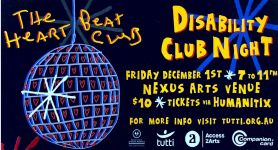 "Tutti Arts - Disability Club Night - Promotional Card" Tutti Arts 'Disability Club Night' Promotional Card
"Tutti Arts - Disability Club Night - Promotional Card" Tutti Arts 'Disability Club Night' Promotional Card -
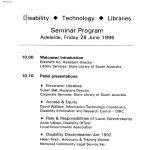 "Arts Disability Technology Library Program" Library access, equity, inclusion, and anti-discrimination seminar and presentation sessions
"Arts Disability Technology Library Program" Library access, equity, inclusion, and anti-discrimination seminar and presentation sessions -
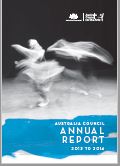 "Australia Council - Annual Report 2013-14" Australia Council Annual Report 2013-2014 – discusses year in review, report from the CEO, Strategic priorities, funding overview, statement of outcome, about the Australia Council including The Governing Council and the Board, Structure of the Australia Council; financial review and discussion of funding for numerous programs including a new Artists with Disability Program grant which funded development opportunities and creative projects for practitioners with disability and the dance board funded development and presentation of new work, workshops and residency programs, and strategic initiatives that focus on leadership, development and collaboration with a highlight being the “Torque Show” supported for the Melbourne premiere of “Intimacy”, a collaboration with Michelle Ryan presented as part of the Unlimited Festival in London which celebrates originality of artists with disability.
"Australia Council - Annual Report 2013-14" Australia Council Annual Report 2013-2014 – discusses year in review, report from the CEO, Strategic priorities, funding overview, statement of outcome, about the Australia Council including The Governing Council and the Board, Structure of the Australia Council; financial review and discussion of funding for numerous programs including a new Artists with Disability Program grant which funded development opportunities and creative projects for practitioners with disability and the dance board funded development and presentation of new work, workshops and residency programs, and strategic initiatives that focus on leadership, development and collaboration with a highlight being the “Torque Show” supported for the Melbourne premiere of “Intimacy”, a collaboration with Michelle Ryan presented as part of the Unlimited Festival in London which celebrates originality of artists with disability. -
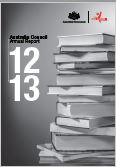 "Australia Council - Annual Report 2012-13" Australia Council Annual Report 2012-2013 – discusses year in review, report from the CEO, Strategic priorities, funding overview, statement of outcome, about the Australia Council including The Governing Council and the Board, Structure of the Australia Council; financial review and discussion of Access Champions group focused on key actions from the 2011–13 Disability Action Plan, including programs for increased participation by artists with disabilities and to develop technical capacity and digital literacy for both operational and artistic activities, funding for exhibition of artists with disability work, premises and Australia Council website accessibility, and participation at national and international arts and disability forums.
"Australia Council - Annual Report 2012-13" Australia Council Annual Report 2012-2013 – discusses year in review, report from the CEO, Strategic priorities, funding overview, statement of outcome, about the Australia Council including The Governing Council and the Board, Structure of the Australia Council; financial review and discussion of Access Champions group focused on key actions from the 2011–13 Disability Action Plan, including programs for increased participation by artists with disabilities and to develop technical capacity and digital literacy for both operational and artistic activities, funding for exhibition of artists with disability work, premises and Australia Council website accessibility, and participation at national and international arts and disability forums. -
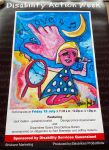 "Salubrious Productions - Disability Action Week" Music event for Disability Action Week
"Salubrious Productions - Disability Action Week" Music event for Disability Action Week -
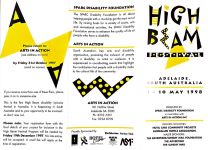 "High Beam Festival 1998 Flyer" High Beam Festival Flyer 1998 reads "This is the first High Beam disability inclusive festival in Australia. It is happening in South Australia and its your opportunity to be involved so don't miss out. … HIGH BEAM FESTIVAL INCLUDES: • A spectacular opening night of celebration. • A lively Cabaret/Porty featuring some of Australia's top entertainers. • Two days of stimulating seminars with topics covering arts, disability and healthy communities. • A week-long program of disability inclusive events at The Governor Hindmarsh Hotel. • A promotional campaign that will attract people from around Australia. • Multi-media promotional opportunities including free entry in the official festival program."
"High Beam Festival 1998 Flyer" High Beam Festival Flyer 1998 reads "This is the first High Beam disability inclusive festival in Australia. It is happening in South Australia and its your opportunity to be involved so don't miss out. … HIGH BEAM FESTIVAL INCLUDES: • A spectacular opening night of celebration. • A lively Cabaret/Porty featuring some of Australia's top entertainers. • Two days of stimulating seminars with topics covering arts, disability and healthy communities. • A week-long program of disability inclusive events at The Governor Hindmarsh Hotel. • A promotional campaign that will attract people from around Australia. • Multi-media promotional opportunities including free entry in the official festival program." -
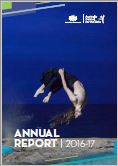 "Australia Council - Annual Report 2016-17" Australia Council Annual Report 2016-2017 – discusses purpose, reports from chair and CEO, year in review, report from the CEO, Strategic priorities, funding overview, statement of outcome, about the Australia Council including The Governing Council and the Board, Structure of the Australia Council with new grants model; performance outcomes, manageability and accountability, financial statements and discussion of the final year of delivering $1.3 million over four years to support artists with disability with their careers and funding more organisations to support producing and touring disability-led and mixed-ability arts practice as well as mentoring arts leaders with disabilities and publication of the Council’s 2014–16 Disability Action Plan review.
"Australia Council - Annual Report 2016-17" Australia Council Annual Report 2016-2017 – discusses purpose, reports from chair and CEO, year in review, report from the CEO, Strategic priorities, funding overview, statement of outcome, about the Australia Council including The Governing Council and the Board, Structure of the Australia Council with new grants model; performance outcomes, manageability and accountability, financial statements and discussion of the final year of delivering $1.3 million over four years to support artists with disability with their careers and funding more organisations to support producing and touring disability-led and mixed-ability arts practice as well as mentoring arts leaders with disabilities and publication of the Council’s 2014–16 Disability Action Plan review. -
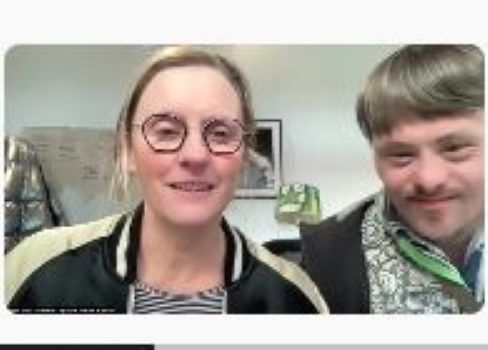 "Interview with Luke Cambpell and Kelly Drummond Cawthon" Luke Campbell is a theatre performer, writer and director and has been with Second Echo since 2015. Interview Summary In the interview Luke Campbell and Kelly Drummond Cawthon from Second Echo Ensemble share insights into their creative processes and the significance of their work. Luke, a core artist for the ensemble, emphasizes the role of deep listening and communication in his art, comparing his work to a meditative exploration of sound and connection, akin to the themes in the movie "Avatar." Kelly, as the ensemble's creative director, highlights the importance of presenting their work across diverse platforms to reach broader audiences and foster inclusive discussions. Throughout the conversation, they express views on the challenges and perceptions surrounding disability arts, advocating for recognition of diverse voices and stories in the arts community.
"Interview with Luke Cambpell and Kelly Drummond Cawthon" Luke Campbell is a theatre performer, writer and director and has been with Second Echo since 2015. Interview Summary In the interview Luke Campbell and Kelly Drummond Cawthon from Second Echo Ensemble share insights into their creative processes and the significance of their work. Luke, a core artist for the ensemble, emphasizes the role of deep listening and communication in his art, comparing his work to a meditative exploration of sound and connection, akin to the themes in the movie "Avatar." Kelly, as the ensemble's creative director, highlights the importance of presenting their work across diverse platforms to reach broader audiences and foster inclusive discussions. Throughout the conversation, they express views on the challenges and perceptions surrounding disability arts, advocating for recognition of diverse voices and stories in the arts community. -
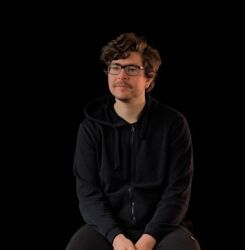 "Interview with Michael Noble" Michael Noble is a professional dancer and performer and has been with Restless Dance Theatre since 2015. Interview Summary Michael Noble is an ex-foster kid turned contemporary dancer at Restless Dance Theatre, who started in arts as an outlet for expression. His dance style has evolved from literal interpretations to more abstract movements, as Restless has supported his growth and mental health needs. Being in a company that accommodates artists with disabilities has led Michael to explore his own neurodivergence, specifically relating to being on the autism spectrum. He believes art, including the political, is less about the message itself and more about being the messenger for another's vision or interpreting and sharing one's own perspectives.
"Interview with Michael Noble" Michael Noble is a professional dancer and performer and has been with Restless Dance Theatre since 2015. Interview Summary Michael Noble is an ex-foster kid turned contemporary dancer at Restless Dance Theatre, who started in arts as an outlet for expression. His dance style has evolved from literal interpretations to more abstract movements, as Restless has supported his growth and mental health needs. Being in a company that accommodates artists with disabilities has led Michael to explore his own neurodivergence, specifically relating to being on the autism spectrum. He believes art, including the political, is less about the message itself and more about being the messenger for another's vision or interpreting and sharing one's own perspectives. -
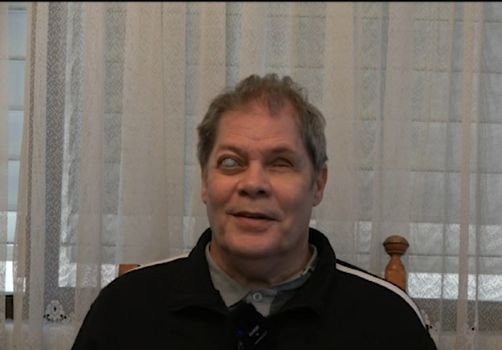 "Interview with Jeff Usher" Jeff Usher is a jazz and blues composer, arranger, pianist, vocalist, teacher, lecturer, and music consultant. Interview Summary Jeff Usher is a visually impaired Australian jazz musician with a rich history of playing music since childhood, influenced by a significant early encounter with the Jazz Action Society and key individuals like his high school music teacher Kathleen Kerr and his supportive family. Throughout his career, he has worked with a diverse range of musicians across many genres, including country, rock, and church music, and has expanded his repertoire to include political and spiritual themes, often infused with his synaesthetic experience of colour. Despite a broad professional experience, his engagement with the disability arts space developed over time, particularly through collaboration with other disabled artists, and he values working with good artists regardless of their backgrounds or disabilities. He is deeply committed to his craft, finding a balance between the aesthetic quality of his work and the joy it brings, both to himself and his audiences.
"Interview with Jeff Usher" Jeff Usher is a jazz and blues composer, arranger, pianist, vocalist, teacher, lecturer, and music consultant. Interview Summary Jeff Usher is a visually impaired Australian jazz musician with a rich history of playing music since childhood, influenced by a significant early encounter with the Jazz Action Society and key individuals like his high school music teacher Kathleen Kerr and his supportive family. Throughout his career, he has worked with a diverse range of musicians across many genres, including country, rock, and church music, and has expanded his repertoire to include political and spiritual themes, often infused with his synaesthetic experience of colour. Despite a broad professional experience, his engagement with the disability arts space developed over time, particularly through collaboration with other disabled artists, and he values working with good artists regardless of their backgrounds or disabilities. He is deeply committed to his craft, finding a balance between the aesthetic quality of his work and the joy it brings, both to himself and his audiences. -
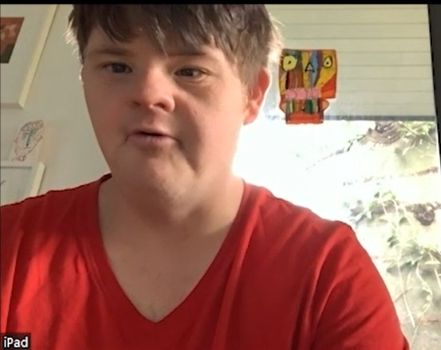 "Interview with Digby Webster" Digby Webster is a visual artist working with the mediums of oil pastels and acrylics and is also a performer, designer and co-founding member of past performance ensemble Ruckus Ensemble. Interview Summary Digby Webster is an artist with a wide range of creative talents, including theater, dance, animation, and mural painting. He has worked on various projects, including an animated short film called "Blockhead and Sparklehorse," and has had his artwork displayed in places like the Sydney Olympic Park and Vivid Sydney. Digby does not define himself by his disability and takes pride in the various creative endeavors he's involved in, aiming to have his art reach people in meaningful ways outside traditional galleries. In the future, he is interested in exploring fashion, designing artwork for clothing, and he hopes to see more people wearing his art.
"Interview with Digby Webster" Digby Webster is a visual artist working with the mediums of oil pastels and acrylics and is also a performer, designer and co-founding member of past performance ensemble Ruckus Ensemble. Interview Summary Digby Webster is an artist with a wide range of creative talents, including theater, dance, animation, and mural painting. He has worked on various projects, including an animated short film called "Blockhead and Sparklehorse," and has had his artwork displayed in places like the Sydney Olympic Park and Vivid Sydney. Digby does not define himself by his disability and takes pride in the various creative endeavors he's involved in, aiming to have his art reach people in meaningful ways outside traditional galleries. In the future, he is interested in exploring fashion, designing artwork for clothing, and he hopes to see more people wearing his art. -
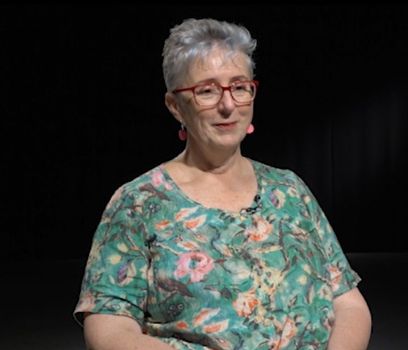 "Interview with Jenny Simpson" Jenny is CEO and Artistic Director of AWESOME Arts Australia while also a Musical Director of the Mighty Camelot Community Choir and a Sessional Academic at the Western Australian Academy of Performing Arts at Edith Cowan University. Interview Summary Jenny Simpson is the CEO and Artistic Director of AWESOME Arts Australia. She grew up in a musical family and always had an interest in the arts. After working in the corporate world, she decided to pursue a role in the arts to make a difference in the community. She has since focused on engaging young people with disabilities in the arts, and has worked on projects and festivals that promote inclusivity and accessibility. She believes that the perception of disability arts is changing and hopes to see more individuals with disabilities involved in arts management.
"Interview with Jenny Simpson" Jenny is CEO and Artistic Director of AWESOME Arts Australia while also a Musical Director of the Mighty Camelot Community Choir and a Sessional Academic at the Western Australian Academy of Performing Arts at Edith Cowan University. Interview Summary Jenny Simpson is the CEO and Artistic Director of AWESOME Arts Australia. She grew up in a musical family and always had an interest in the arts. After working in the corporate world, she decided to pursue a role in the arts to make a difference in the community. She has since focused on engaging young people with disabilities in the arts, and has worked on projects and festivals that promote inclusivity and accessibility. She believes that the perception of disability arts is changing and hopes to see more individuals with disabilities involved in arts management. -
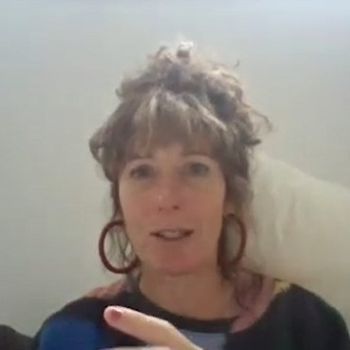 "Interview with Jodee Mundy OAM" Jodee Mundy OAM is a Disabled creative director, performer, writer, activist, creative producer, executive producer, commissioner, interpreter, film, festival maker and cultural leader. Interview Summary Jodee Mundy OAM, is an artist and festival director who identifies as Coda (child of Deaf adults) and lives with chronic illness reflects on the historical and ongoing challenges faced by Deaf and Disabled artists in Australia. Her work is deeply political, aiming to tell untold stories and bring visibility to marginalized communities. Despite significant achievements, Jodee stresses the need for structural support and inclusivity within the industry, especially given the limitations of hybrid access models post-pandemic. Jodee's personal journey, including her recent incurable cancer diagnosis, shapes her advocacy for a culture of care and well-being in the arts. Jodee leads Alter State, Australia’s Disability- led arts festival presented by Arts Centre Melbourne and Arts Access Victoria.
"Interview with Jodee Mundy OAM" Jodee Mundy OAM is a Disabled creative director, performer, writer, activist, creative producer, executive producer, commissioner, interpreter, film, festival maker and cultural leader. Interview Summary Jodee Mundy OAM, is an artist and festival director who identifies as Coda (child of Deaf adults) and lives with chronic illness reflects on the historical and ongoing challenges faced by Deaf and Disabled artists in Australia. Her work is deeply political, aiming to tell untold stories and bring visibility to marginalized communities. Despite significant achievements, Jodee stresses the need for structural support and inclusivity within the industry, especially given the limitations of hybrid access models post-pandemic. Jodee's personal journey, including her recent incurable cancer diagnosis, shapes her advocacy for a culture of care and well-being in the arts. Jodee leads Alter State, Australia’s Disability- led arts festival presented by Arts Centre Melbourne and Arts Access Victoria. -
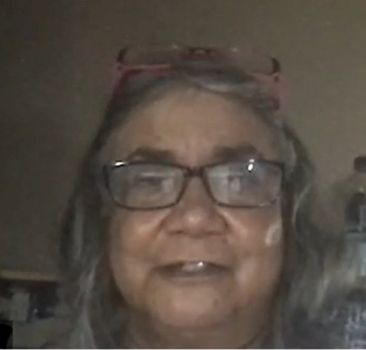 "Interview with Gayle Kennedy"
"Interview with Gayle Kennedy" -
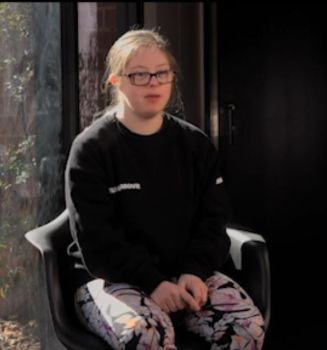 "Interview with Darcy Carpenter" Darcy Carpenter is a professional dancer and has performed with Restless Dance Theatre since 2014. Interview Summary: Darcy is a professional dancer with a family history in dance, who works with Restless Dance Theatre and has worked with the Riverland Youth Theatre. Darcy expressed her passion for dance and acting, mentioning her desire to share emotional experiences with her audience and her personal growth as an artist through the support of Restless Dance Theatre organisation. Throughout the interview, Darcy’s pride as a third-generation dancer shone through, along with her aspirations to continue developing her artistry.
"Interview with Darcy Carpenter" Darcy Carpenter is a professional dancer and has performed with Restless Dance Theatre since 2014. Interview Summary: Darcy is a professional dancer with a family history in dance, who works with Restless Dance Theatre and has worked with the Riverland Youth Theatre. Darcy expressed her passion for dance and acting, mentioning her desire to share emotional experiences with her audience and her personal growth as an artist through the support of Restless Dance Theatre organisation. Throughout the interview, Darcy’s pride as a third-generation dancer shone through, along with her aspirations to continue developing her artistry. -
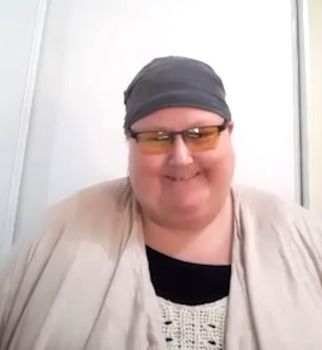 "Interview with Joanne Braddy" Joanne Braddy is a disability Advocate with lived experience and creates honest and insightful work about her experiences of anxiety and depression, as a way of breaking down stigmas that stand in the way of healing through painting, drawing, and ceramics to create emotive self-portraits. Interview Summary Joanne is an Australian visual artist with a 15-year career. She began creating art as an outlet for her mental health struggles and her work, which encompasses drawings, paintings, sculptures, and poetry, helps others by bringing awareness to mental health issues. Joanne finds a lack of accessibility with literacy and industry understanding but she remains motivated to exhibit her work and reduce mental health stigma, expressing the need for a supportive gallery to represent her. Despite these challenges, she aspires to have her substantial body of work seen more broadly and possibly go on tour, with the help of a mentor to guide her through the complexity of the art industry.
"Interview with Joanne Braddy" Joanne Braddy is a disability Advocate with lived experience and creates honest and insightful work about her experiences of anxiety and depression, as a way of breaking down stigmas that stand in the way of healing through painting, drawing, and ceramics to create emotive self-portraits. Interview Summary Joanne is an Australian visual artist with a 15-year career. She began creating art as an outlet for her mental health struggles and her work, which encompasses drawings, paintings, sculptures, and poetry, helps others by bringing awareness to mental health issues. Joanne finds a lack of accessibility with literacy and industry understanding but she remains motivated to exhibit her work and reduce mental health stigma, expressing the need for a supportive gallery to represent her. Despite these challenges, she aspires to have her substantial body of work seen more broadly and possibly go on tour, with the help of a mentor to guide her through the complexity of the art industry. -
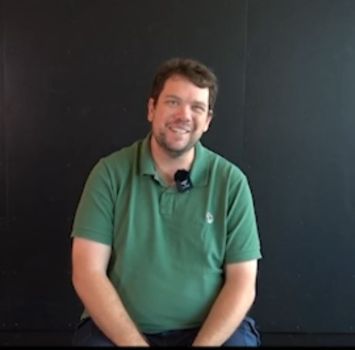 "Interview with Martin Edge" Martin Edge is a visual artist whose colourful paintings depict everyday life Interview Summary Martin Edge, an artist and ambassador for Autism Queensland, has experienced a significant journey in disability arts, culminating in representation by prominent galleries and inclusion in major collections. Since starting his painting career accidentally in a TAFE course, Martin's technique has evolved from using primary colours to creating a unique palette with mixed hues, resulting in more detailed and refined works. People have responded positively to his vibrant and hopeful art, which he enjoys sharing to bring joy to others. Martin looks up to artist Ken Done, admiring Done's vivid use of colour and his contributions to Australian art even into his 80s.
"Interview with Martin Edge" Martin Edge is a visual artist whose colourful paintings depict everyday life Interview Summary Martin Edge, an artist and ambassador for Autism Queensland, has experienced a significant journey in disability arts, culminating in representation by prominent galleries and inclusion in major collections. Since starting his painting career accidentally in a TAFE course, Martin's technique has evolved from using primary colours to creating a unique palette with mixed hues, resulting in more detailed and refined works. People have responded positively to his vibrant and hopeful art, which he enjoys sharing to bring joy to others. Martin looks up to artist Ken Done, admiring Done's vivid use of colour and his contributions to Australian art even into his 80s. - David Throsby
- "Australian Institute of Health and Welfare (1993) Australia's welfare 1993: services and assistance. Canberra: AGPS."
-
“Deaf film ‘A Silent Agreement’ is released in 2017” The Deaf film ‘A Silent Agreement’ was released in 2017 (written and directed by Davo Hardy). This romantic drama features a profoundly Deaf human rights activist and his filmmaker boyfriend with a speech impediment. It is said to be the first Australian film to feature Auslan as the main dialogue. Some scenes are entirely in Auslan. Screen Australia calls it the “first Australian film to feature Auslan.”
-
“Deaf activist and artist Asphyxia creates a music course and accessible music app for D/deaf people” Asphyxia, a profoundly Deaf Australian activist, artist, author and composer created a music course (2020) for people who are D/deaf and Hard of Hearing to write their own music. In 2023, Asphyxia also created an app called Amplio to make music more accessible to D/deaf people.
-
“Disabled People’s International (Australia) (DPIA) formed in 1983” The organisation Disabled People’s International (Australia) (DPIA) was formed in 1983. Thirteen disabled Australians who attended Disabled People’s International (DPI) first world assembly in Singapore in 1981, the International Year of the Disabled Person, returned home to set up the Australian branch two years later. The Women with Disabilities Australia online history reports that DPIA “from the outset, was dominated by disabled men. Only 3 of the 11 members of its governance structure were women, and there was no mention of women or gender in DPIA goals and objectives.” This led to the establishment of a women’s network within DPIA, known as the National Women’s Network (DPIA).
